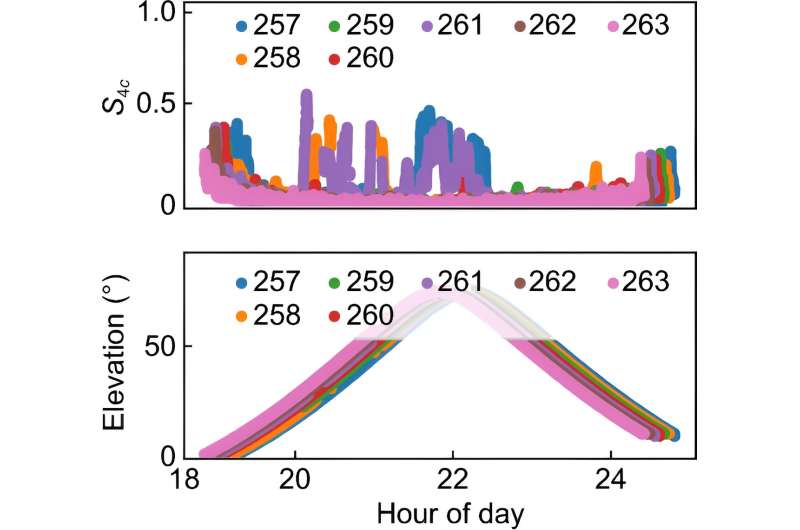This article has been reviewed according to Science X's editorial process and policies. Editors have highlighted the following attributes while ensuring the content's credibility:
fact-checked
proofread
Predicting space weather: Machine learning enhances GNSS signal stability

Ionospheric scintillation, caused by irregularities in the Earth's ionosphere, can severely impact Global Navigation Satellite System (GNSS) signal integrity, leading to navigation errors.
Traditional detection methods rely on expensive and specialized ionospheric scintillation monitoring receivers (ISMRs). However, with the increasing reliance on GNSS for various applications, there is a pressing need for a more accessible and cost-effective detection method.
Due to these challenges, there is a need for in-depth research on utilizing common GNSS receivers to detect ionospheric scintillation events.
Led by a team of researchers from Hong Kong Polytechnic University, a new study was published in the journal Satellite Navigation on 3 June 2024. The team introduced a novel strategy that uses common geodetic GNSS receivers to identify ionospheric amplitude scintillation events with remarkable precision, potentially transforming GNSS monitoring.
The research focuses on utilizing the vast network of geodetic GNSS receivers to detect ionospheric scintillation events, which are typically identified by specialized ISMRs. The proposed method employs a pre-trained machine learning decision tree algorithm that processes the carrier-to-noise ratio (C/N0) and elevation angle data collected at 1-Hz intervals.
By mitigating multipath effects through detailed analysis of multipath patterns, the study effectively reduces noise and false alarms, ensuring the accuracy of the scintillation detection. The methodology involves computing an alternative scintillation index (S4c) based on C/N0 measurements from geodetic GNSS receivers.
This index shows a high correlation with the traditional S4 index used by ISMRs, despite the higher susceptibility of geodetic receivers to noise and multipath interference. The machine learning algorithm enhances detection accuracy by leveraging the periodic nature of multipath effects, which differ from the irregularities of scintillation.
Experimental results demonstrate that the decision tree algorithm achieves a remarkable 99.9% detection accuracy, surpassing traditional hard and semi-hard threshold methods.
Dr. Yiping Jiang, the lead researcher, stated, "Our study showcases the potential of integrating machine learning with widely available GNSS receivers to revolutionize ionospheric scintillation detection. This method not only provides a cost-effective alternative to specialized equipment but also enhances the accuracy and reliability of space weather monitoring."
The implications of this research are far-reaching, offering a scalable solution for GNSS users worldwide. By improving the detection of scintillation events, it contributes to the development of more accurate navigation algorithms and techniques.
This advancement is crucial for various applications, including aviation, maritime, and land transportation, where GNSS reliability is paramount.
More information: Wang Li et al, Amplitude scintillation detection with geodetic GNSS receivers leveraging machine learning decision tree, Satellite Navigation (2024). DOI: 10.1186/s43020-024-00136-7

















